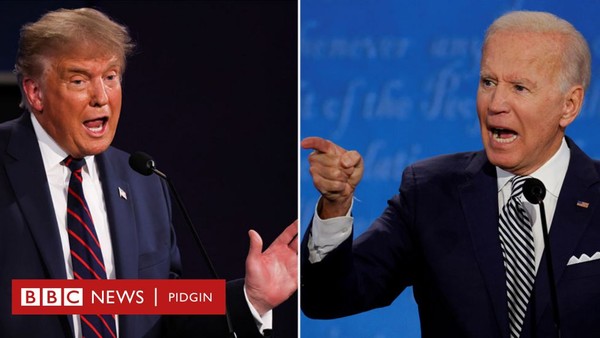The presidential debates historically have been an important part of the US elections, as voters anticipate to hear the candidates’ platforms and plans for the country. However, the first presidential debate between Trump and Biden frustrated many voters due to its lack of substance. Meanwhile, the vice presidential debate has gained more attention as the candidates had less exchange of insults and more meaningful discussions. In this Spotlight, we explore and analyze the main takeaways of the debates.
The first US presidential debate on September 29 between incumbent president Donald Trump and former vice president Joe Biden was widely criticized for being a low point in American politics. Overall, the 90-minute debate was filled with insults and interruptions rather than productive policy debate. Both candidates talked over each other, and Trump aggressively interrupted exactly 73 times. When the debate moderator Chris Wallace asked Biden if he supported ending the Senate filibuster or putting more than nine justices on the US Supreme Court, Biden avoided the question and instead encouraged Americans to speak and vote. Trump interrupted with charged questions, to which Biden responded, “Would you shut up, man?”

James Fallows, a staff writer of The Atlantic, called it “a disgusting night for democracy”. The New York Times columnist Frank Bruni further commented that Joe Biden should not debate Trump again “after Tuesday night’s horror show: a disgrace to the format, an insult to the country, a nearly pointless 90 minutes”. Even media outlets abroad poured disappointments — a Russian state TV channel remarked, “The candidates behaved as badly as their voters.” Most criticisms rest on the idea that decorous debates are sacred institutions of democracy. However, this ideal may not have substantive historical basis, as many studies have shown that debates between presidential candidates make virtually no difference to the electoral outcome. Most presidential debates are not really debates, because candidates are busy reading out their scripted platforms and platitudinous soundbites.
This year’s debate between Trump and Biden stood out in that it actually seemed like an argument between real people, rather than that of detached and slick politicians. Amid rapid-fire rebuttals and cross-talk, the candidates revealed their true selves. Commentators noted that Trump’s efforts to push Biden off-balance actually benefited Biden more than him, because it proved to the viewers that Biden could hold himself up under pressure and that he has not lost a step due to his advancing age. In fact, Trump’s heckles and ad hominem attacks may have backfired, as it showed his inability to make coherent arguments and advocate for policies.
Mudslinging has been an inevitable part of politics throughout history. Democracy thrives when discussions are not restricted by formalities. In that regard, the first presidential debate was successful. It gave meaningful insight into the candidates’ characters. The first televised presidential debate in 1960 between John F. Kennedy and Richard Nixon, which was also considered one of the most notable debates in history, was an intense showdown like this year’s debate. Kennedy and Nixon bent the previous rules of engagement, much to the contemporaneous commentators' shock. How Trump and Biden’s debate differed from that of Kennedy and Nixon was in its lack of substance. Trump and Biden failed to move beyond mudslinging and engage in constructive policy dialogue, when the country is in desperate need of one.
What was most disappointing about the first presidential debate was not the lack of decorum and civility, but the lack of vision presented for a country that is suffering from a global pandemic and racial tensions. The candidates spent 20 minutes on the topic of COVID-19, yet they failed to outline measures that were needed to contain virus transmissions, which have so far led to more than 210,000 deaths and are still rapidly increasing. On the topic of racial inequality, the candidates were busy condemning each other rather than engaging in constructive discussions on how to reunite the country. Biden targeted Trump for failing to support the Black community and cited that one in 1,000 African Americans have died of coronavirus under Trump’s leadership. Trump responded by calling out Biden on the 1994 Crime Bill that he authored when he was a senator, which contributed to the mass incarceration of the Black community.
Overall, the first presidential debate was disappointing, but not pointless. However, in order to prove themselves worthy of becoming “the leader of the free world” — if that position is even still up for grabs — the two candidates will have to put an end to petty arguments and present a coherent vision for the next four years. Voters have heard enough about who they are. Now, they want to know what they have got to offer.

